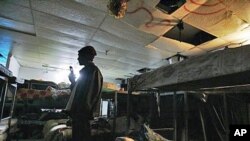The government of Israel recently said it would begin deporting illegal immigrants from two African countries because conflicts there had subsided and it was safe to return home. Opponents of the decision obtained court rulings postponing the deportations, but these rulings are to expire soon.
Moses Gadia is a 35-year-old hotel worker originally from a village near Yambio, in newly independent South Sudan. Five years ago, he crossed into Israel from Egypt with his wife and two children. A third child was later born here.
Gadia said he is grateful that initially he was able to work and support his family. But that changed a few months ago. The Israeli government announced it would begin deporting undocumented workers from South Sudan because a decades-long war had ended with the country's independence last year.
“Most of the families [in Israel] are in danger. Their lives are like somebody in the jungle because of no work. They don't have money and they cannot go to hospital,” said Gadia.
Immigrant advocates cite short notice
An Israeli supporter of the South Sudanese immigrant community, Rami Gudovitch, said the 700 South Sudanese migrants here were given only two months to leave on their own.
"This was a very short notice and we were extremely concerned knowing from the community that the situation in South Sudan is actually very close to a disaster," said Gudovitch.
He said there still is fighting between South Sudan and neighboring Sudan. And the United Nations has declared the region a humanitarian disaster because of shortages of food and basic human services.
The Israeli government also has ordered the deportation of about 2,000 citizens of Ivory Coast who fled its civil war 10 years ago. The conflict ended in principle last year after former President Laurent Gbagbo was removed from power and his opponent who won disputed elections in 2010, Alassane Ouattara, was installed as president.
Migrant workers face uncertainty at home
A lawyer for the Hotline for Migrant Workers group, Asaf Weitzen, said tensions continue in Ivory Coast and some asylum seekers could face reprisals from the new government.
"There are still people who were maybe against the current regime, people who have suffered from persecution, which does not allow them to go back to Ivory Coast, etc. Those people must be able to ask for asylum," said Weitzen.
Amidst demonstrations and legal appeals, Israeli courts have extended the deadlines, but these are due to expire in early May.
Activists say almost all of the estimated 55,000 undocumented migrants in Israel are vulnerable. More than 85 percent of them are from Eritrea and northern Sudan. Because of persecution and instability in their countries they have been allowed to stay, but only temporarily.
Weitzen said that in principle this is to allow them to seek refugee status, but most are not able to apply.
"Probably because the state knows that if they were examined most of them would be recognized as refugees, the state doesn't even allow them to ask for refugee status. The only thing the state does is releasing them from prison and declaring them as people who deserve temporary protection," said Weitzen.
Of those migrants who have been able to apply only a handful, less than one percent, have been granted refugee status. This is much lower than acceptance rates in most countries which range from ten percent to 50 percent or more.
While under temporary protection, the migrant is free and can work temporarily. But jobs are scarce, and as a result, many sleep on the streets and some turn to crime, which creates resentment among ordinary Israelis.
Significant surge in Israel migrant population
The Israel representative of the U.N. High Commissioner for Refugees, William Tall, noted that the average number of migrants entering Israel illegally has doubled from 1,000 per month last year to 2,000 per month this year. Five years ago there were almost none.
"Israel has joined the club, so to speak, of countries that now are attracting significant mixed migration flows. One can understand the genuine alarm of the government of [over] any unrestrained movement across the border itself," said Tall.
The Israeli government calls them infiltrators. Prime Minister Benjamin Netanyahu said recently that most are not really refugees.
He said it is a national plague economically, socially, in infrastructure, welfare and from the point of view of internal security. He said Israel will continue to take in refugees from war, but must stop others who pose what he calls a serious threat to the character and future of Israel.
The Israeli government is building a three meter-high fence along its border with Egypt aimed at preventing illegal crossings by migrants, as well as by smugglers and terrorists. It also is constructing a detention facility in southern Israel to hold up to 11,000 illegal immigrants.
U.N. refugee official Tall said the government is still adjusting to the situation.
"This is a country that maybe six or seven years ago didn't even conceive of such mixed migration flows coming to the country. So they're developing an asylum system, but it is still quite a bit in its infancy now," said Tall.
He said many Israeli officials are sympathetic to the plight of immigrants in part because of the Jewish people's history of exile and suffering. But he said the government must improve the asylum application process.
This does not ease the worries of Moses Gadia, who said he no longer has family in South Sudan that can take him in. He said he is willing to return home or go to another country, but he would need more time and long-term support in order to do so.
News
Israeli Deportation Order Threatens Some African Migrants
- By Scott Bobb






